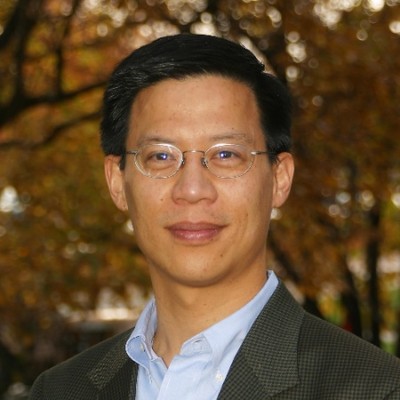
His current focus is developing new well-being metrics by using massive online choice experiments. He also studies the application of machine learning techniques to measure individual-level latent parameters. Lee
Before coming to Stanford, JJ worked at the MIT Initiative on the Digital Economy as a postdoctoral associate. He received his PhD in economics at Claremont Graduate University in 2019.
Lee has work experience as a business consultant, a financial analyst and a policy analyst in South Korea before his doctoral study. He also holds a bachelor degree in economics from Seoul National University and a master’s degree in public policy from KDI School of Public Policy and Management.
David’s research explores new and better ways to measure the modern and digital economy. He is particularly interested in advancing economic metrics and statistics on economic output and welfare.
Prior to joining the Stanford Digital Economy Lab, David worked as an economist at the OECD in Paris, and as a senior economist at the National Institute of Economic and Social Research (NIESR). As a research associate, he remains affiliated to the London-based Economic Statistics Centre of Excellence (ESCoE). David received his PhD from the London School of Economics.
Jiaxin Pei is currently a postdoctoral fellow at Stanford University working with Alex ‘Sandy’ Pentland, Diyi Yang and Erik Brynjolfsson. He is affiliated with the Digital Economy Lab and the NLP group. Jiaxin obtained my PhD from Blablablab, UMSI (School of Information, University of Michigan) advised by David Jurgens. He also worked with Jun Li at Ross School of Business. Before coming to Michigan, Jiaxin was an undergraduate student at the School of Computer Science, Wuhan University.
Jiaxin has very broad interests in human-centered AI, natural language processing, and computational social science. His overarching research ambition is to make human communications more effective and constructive by developing human-centered AI systems and analyzing large-scale human communication data.
His work has won a Best Student Paper Award at the ACM Conference on Equity and Access in Algorithms, Mechanisms, and Optimization (EAAMO), a Best Demo Paper Award at the AAAI Conference on Human Computation and Crowdsourcing (HCOMP), an Honorable Mention Award at the International Conference on Computational Social Science (IC2S2), and a Best Paper Award at the Workshop on Social Influence in Conversations. Jiaxin is the core developer of POTATO, a open-source data labeling system used by institutions around the world.
Dan Sholler studies what happens when organizations and industries rapidly adopt new technologies. He primarily uses qualitative methods (interviewing, observation, surveys, and archival research) to understand why some workers resist new technologies; how management practices influence technology outcomes; and what role organizational and governmental policies play in shaping the decisions organizations and workers make about using new technologies.
Dan’s research aims to inform technology and labor management strategies, technology governance frameworks, and theories of technological change, especially change that happens in the workplace. He presents the results of the research in academic and practitioner-oriented outlets.
Dan is currently working as a project scientist in the Technology Management Program at the University of California, Santa Barbara College of Engineering. He works with Dr. Matt Beane and studies the implementation, management, and labor implications of robotics and automation in the manufacturing and logistics industries.
He is also the principal investigator on a project documenting the histories of two open-source software languages via oral histories and archival research, supported by the Sloan Foundation. He has also worked as a postdoc with the rOpenSci Project at UC Berkeley’s Institute for Data Science; completed the PhD program and did research at the University of Texas at Austin School of Information; and studied at the University of Pennsylvania’s Department of History and Sociology of Science.
Philip Trammell is an economics DPhil student at Oxford and research affiliate at GPI, an Oxford research institute. His research touches decision theory, game theory, and growth theory. He recently graduated from the MPhil with distinction, where he won the prize for best thesis. Philip also has undergraduate degrees in economics and mathematics from Brown, where he also won the prize for best econ thesis.
Gabriel Unger is an economics PhD student at Harvard. He jointly completed a JD at Yale Law School, and completed his undergraduate education at Harvard. His main field of is macroeconomics. His research broadly attempts to understand how technological changes, like the IT Revolution, change our understanding of important macroeconomic questions, like the mechanics of productivity growth, the rise of industrial concentration, or the transformation of the business cycle.
Luca’s scientific work deals with understanding the effect of AI adoption in organizations. His research centers around three areas. Firstly, he studies algorithmic navigation guidance in human-in-the-loop decision-making systems, delving into the interplay between algorithmic outcomes and human cognitive mechanisms. Secondly, he explores the dynamics of AI diffusion within organizations. Thirdly, he investigates AI’s innovation and design process and the creative work of data scientists. His work has appeared in scientific journals such as the Journal of Product Innovation Management. He was awarded the 2020 Albert Page Award for Outstanding Professional Contribution for the publication “Innovation and Design in the Age of Artificial Intelligence.”

He is interested in technology, innovation, productivity, and the workforce. His prior work experience includes program evaluation and R&D project management in federal government at the National Institute of Standards and Technology, and in public-private partnership programs for early-stage R&D, where he interacted with both start-ups and large corporate R&D centers.
Andrew received a BA in history and economics from the University of California, Berkeley, and a PhD in economics from Harvard University.